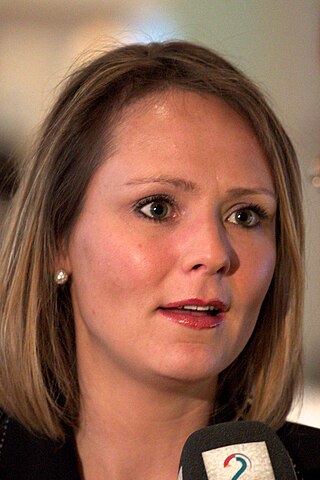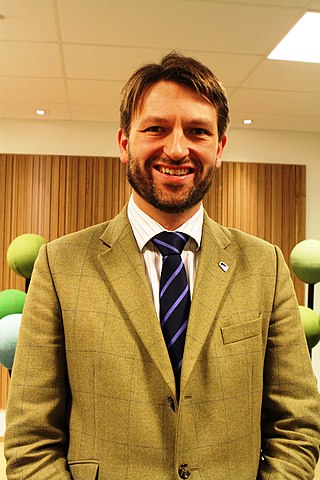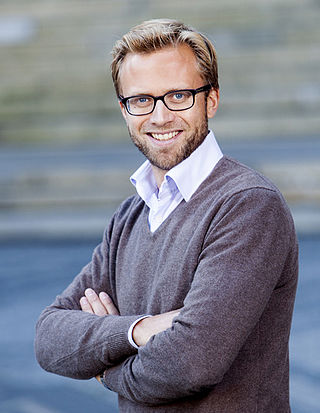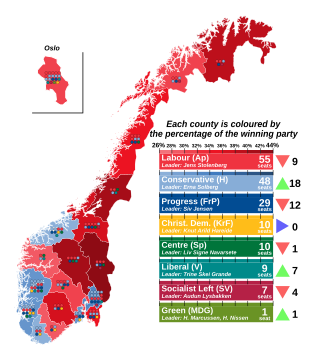The Progress Party, is a political party in Norway. It is generally positioned to the right of the Conservative Party, and is considered the most right-wing party to be represented in parliament. The FrP has traditionally self-identified as classical-liberal and as a libertarian party. It is often described as right-wing populist, which has been disputed in public discourse, and has been described by various academics as far-right. By 2020, the party attained a growing national conservative faction. After the 2017 parliamentary election, it was Norway's third largest political party, with 26 representatives in the Storting. It was a partner in the government coalition led by the Conservative Party from 2013 to 2020.

The Christian Democratic Party is a Christian-democratic political party in Norway founded in 1933. The party is an observer member of the European People's Party (EPP). It currently holds three seats in the Parliament, having won 3.8% of the vote in the 2021 parliamentary election. The current leader of the party is Dag Inge Ulstein.

Erna Solberg is a Norwegian politician and the current Leader of the Opposition. She served as the 35th prime minister of Norway from 2013 to 2021, and has been the leader of the Conservative Party since May 2004.
The Conservative Party or The Right is a liberal-conservative political party in Norway. It is the major party of the Norwegian centre-right, and was the leading party in government as part of the Solberg cabinet from 2013 to 2021. The current party leader is former Prime Minister Erna Solberg. The party is a member of the International Democracy Union and an associate member of the European People's Party.

Terje Søviknes is a Norwegian politician for the Progress Party who has served as the mayor of Bjørnafjorden since 2023. He previously served as minister of petroleum and energy from December 2016 to August 2018. From December 2019 to January 2020 he was the minister of the elderly and public health. He also serves as the party's second deputy leader since 2019, a post he previously held from 1999 to 2001.
In Norway, the Minister of Justice and Public Security is the head of the Royal Norwegian Ministry of Justice and the Police and a member of Government of Norway. The current minister is Emilie Enger Mehl.

Siv Jensen is a Norwegian politician who served as the leader of the Progress Party from 2006 to 2021. She also held the position as Minister of Finance from 2013 to 2020 in the Solberg Cabinet. She was also a member of the Norwegian parliament from Oslo from 1997 to 2021.

Jan Tore Sanner is a Norwegian politician for the Conservative Party who has held several ministerial positions in Erna Solberg's government between 2013 and 2021. He was also the party's deputy leader from 2004 to 2022, having first been second deputy for the first four years and first deputy for the last fourteen. Sanner has also been a member of parliament for Akershus since 1993.

Ine Marie Eriksen Søreide is a Norwegian politician who served as Minister of Foreign Affairs from 2017 to 2021, the first woman to hold the position. Previously, she was the Minister of Defence from 2013 to 2017. A member of the Conservative Party, she was elected in 2005 as a member of the Storting for Oslo. Søreide was appointed Norway's Foreign Minister on 20 October 2017. She succeeded Børge Brende.

Torbjørn Røe Isaksen is a Norwegian politician, MP for the Conservative Party who served as Minister of Labour and Social Inclusion from 2020 to 2021. He previously served as Minister of Trade and Industry from 2018 to 2020 and Minister of Education and Research from October 2013 to January 2018; except from September to November 2017 when he was on parental leave and his duties were undertaken by Henrik Asheim.

Per-Willy Trudvang Amundsen is a Norwegian politician for the Progress Party who served as Minister of Justice from December 2016 to January 2018. He previously served as state secretary in the Ministry of Local Government and Regional Development from 2013, and represented Troms in the Norwegian parliament from 2005 until 2013. He was re-elected in 2017.

Linda Cathrine Hofstad Helleland is a Norwegian politician for the Conservative Party. She held several ministerial positions in Erna Solberg's government between 2015 and 2021, with a break between 2019 and 2021. She also served as Vice President of the World Anti-Doping Association from 2016 to 2019. In parliament, she has represented Sør-Trøndelag since 2009, and been a deputy representative between 2001 and 2009.

Parliamentary elections were held in Norway on 13 and 14 September 2009. Elections in Norway are held on a Monday in September, usually the second or third Monday, as determined by the king. Early voting was possible between 10 August and 11 September 2009, while some municipalities also held open voting on 13 September. Voters elected 169 members for the Storting, each for a four-year term. Voter turn-out in the 2009 general elections was 76.4%.

Eirik Lae Solberg is a Norwegian politician for the Conservative Party. He has served as the governing mayor of Oslo since 2023 and was previously the Oslo City Commissioner for Finance from 2014 to 2015. Lae Solberg has also been a deputy member of parliament for Oslo since 2021, having previously done so between 1993 and 1997 for Buskerud.

Sylvi Listhaug is a Norwegian politician who has been the leader of the Progress Party since 2021.

Nikolai Eivindssøn Astrup is a Norwegian politician representing the Conservative Party. He served as Minister of Local Government from 2020 to 2021. Previously he served as the Minister of International Development from 2018 to 2019 in Prime Minister Erna Solberg's cabinet, being the first since Heikki Holmås from 2012 to 2013. In 2019, he also became the first Minister of Digitalisation after the Christian Democratic Party joined the Cabinet, a post he served in until 2020.

Parliamentary elections were held in Norway on 8 and 9 September 2013 to elect all 169 members of the unicameral Storting. The centre-right coalition obtained 96 seats, while the incumbent red–green coalition government obtained 72 seats and the Green Party obtained one. The Labour Party won the largest share (30.8%) of the votes cast, with the Conservatives coming second (26.8%), after increasing its share by 9.6 percentage points.

Parliamentary elections were held in Norway on 11 September 2017 to elect all 169 members of the unicameral Norwegian Parliament, the Storting. The non-socialist parties retained a reduced majority of 88 seats, allowing Prime Minister Erna Solberg's Conservative-Progress coalition to remain in government. The Liberal Party joined the coalition in January 2018 but it remained a minority cabinet until the Christian Democratic Party joined the coalition in 2019. The three largest centre-left parties won 79 seats. The Green Party retained its single seat, while the Red Party won its first ever seat.

Parliamentary elections were held in Norway on 13 September 2021. All 169 seats in the Norwegian legislature, the Storting, were up for election.

The 2023 Norwegian local elections were held on 11 September 2023. Voters elected representatives to municipal and county councils, which are responsible for education, public transportation, healthcare, elderly care, waste disposal, the levy of certain taxes, and more. All council seats were up for election across the 15 counties and 357 municipalities of Norway.

















